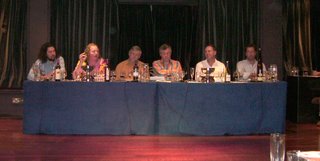The Great Debate

Bibendum hosted a fascinating debate in London this week. Five Australasian wine producers (Aaron Brasher of Petaluma, Brent Marris of Wither Hills, Wayne Stehbens of Katnook, Chester Osborn of d'Arenberg and Matt Gant of St Hallett) were each given 8 minutes to introduce their wineries and wines, and explain what they felt was their unique or defining characteristic. Each was armed with two vintages of one of their wines, one old, one new. At the end of each monologue (and a gong was used to ensure they kept to time) the chair, Willie Lebus, asked the winemakers some questions on burning issues such as closures, ageability of their wines and so on. The audience then voted on whether they agreed or disagreed with the winemaker's views. After all five had spoken, and spilled drinks over Willie, the debate was laid open to the floor. Space does not allow a complete transcript (do we hear a sigh of relief from the reader?) but here are some highlights of what was a really stimulating tasting and discussion.
Brent Marris kicked off with his unique vision for Wither Hills; that the wines should reflect the 'green grass, blue sky, clear water' essence of Marlborough where they are grown. Brent feels that there is no point in New World producers trying to copy Old World styles, they must forge their own identities.
Brent was swiftly followed by Aaron Brasher from Petaluma (whose name Willie felt was best pronounced 'Aron Braisher'). Aaron was presenting the Hanlin Hill Riesling, which co-incidentally has just picked up a gold medal at this year's IWC. The whole point of this wine, he said, was that it received no stirring, no oak, no malo, no messing...'it's just straight Riesling'. Very fine Riesling too. Aaron pointed out that Aussie winemakers love nothing more than a good bottle of Riesling (indeed the rocket-sized magnum on the table before him looked like the perfect antidote to a hard day in the winery). It was a matter of communicating this love of the grape to the consumer at large, and then Riesling would enjoy the popularity of our ubiquitous friend Ms Chardonnay.
Wayne Stehbens began by saying 'there is way too much nonsense talked about wine - most of it at this table.' Having put his fellow winemakers in their place, he began his eulogy to 'the king of grapes - Cabernet Savignon'. Anyone who has met Wayne before would not be entirely surprised to hear him big up the mighty Cabernet, and suggest that Coonawarra was the best spot on earth to grow it. It must be said that the 1998 Katnook Cabernet on show here was pretty strong evidence in Wayne's favour. Wayne bemoaned the grape varieties he called 'one year wonders - look great for 10 minutes after bottling and then fall apart within months.' You would never catch Katnook Cab doing that.
Next the wildly beshirted Chester Osborn explained that, as a fourth generation winemaker from the Osborn family, he had felt the need to continue the traditions of his forefathers. Indeed it was something of a shock to father d'Arry when, having paid for Chester to attend the highly regarded Roseworthy College at Adelaide so that he could 'learn how to make wine properly', Chester announced his intention of carrying on exactly as before - foot treadings, basket pressings, whole berries where possible, shocking shirts at all times. Chester was presenting his Coppermine Road 2001 and 2003 - both good vintages but 'probably not his best', because as he explained he kept the best years to drink himself.
Matt Gant was last on the stage, and cunningly used a selection of props including wine glasses, bottles, chairs and spittoons spread over the floor to illustrate the different vineyard blocks which go into his legendary Old Block Shiraz. Matt's high-energy impersonation of a geography teacher was brought to an abrupt end by the inevitable gong, but not before he had given us a very entertaining round up of the vineyard characters ('from this one you get classic armpit smells - smells just like me in fact'; 'this one is bloody mary in a glass').
The panel were asked their views on the appellation system, and all agreed their was no sense in constricting the inventiveness and innovation of Australasian winemakers with draconian laws about what they could and couldn't plant. The overall sentiment was that these are still very young wine producing countries, and have yet to fully discover where all their strengths and weaknesses lie. Organic wines were discussed, and Chester Osborn said that most of his wines were made in an organic way, but the 'bearded weirdy' reputation of the organic movement (in Oz presumably) was one he didn't feel the need to be associated with; 'Most people think I'm crazy already anyway'.
The debate finished with a discussion on what Fine Wine represented - there were many differing but equally valid views expressed. What was incontestible was the quality of the wines on show, and the passion of the people behind them.

1 Comments:
Very good blog, update it hurts no more.
Post a Comment
<< Home